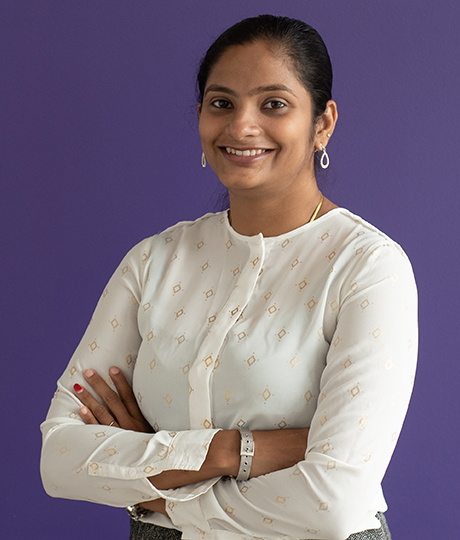Allen School alumna Rajalakshmi Nandakumar (Ph.D., ‘20), now a faculty member at Cornell University, received the SIGMOBILE Doctoral Dissertation Award from the Association for Computing Machinery’s Special Interest Group on Mobility of Systems Users, Data, and Computing “for creating an easily-deployed technique for low-cost millimeter-accuracy sensing on commodity hardware, and its bold and high-impact applications to important societal problems.” Nandakumar completed her dissertation, “Computational Wireless Sensing at Scale,” working with Allen School professor Shyam Gollakota in the University of Washington’s Networks & Mobile Systems Lab.
In celebrating Nandakumar’s achievements, the SIGMOBILE award committee highlighted “the elegance and simplicity” of her approach, which turns wireless devices such as smartphones into active sonar systems capable of accurately sensing minute changes in a person’s movements. The committee also heralded her “courage and strong follow-through” in demonstrating how her technique can be applied to real-world challenges — including significant public health issues affecting millions of people around the world.
Among the contributions Nandakumar presented as part of her dissertation was ApneaApp, a smartphone-based system for detecting a potentially life-threatening condition, obstructive sleep apnea, that affects an estimated 20 million people just in the United States alone. Unlike the conventional approach to diagnosing apnea, which involves an overnight stay in a specialized lab, the contactless solution devised by Nandakumar and her Allen School and UW Medicine collaborators could be deployed in the comfort of people’s homes. ApneaApp employs the phone’s speaker and microphone to detect changes in a person’s breathing during sleep, without requiring any specialized hardware. It works by emitting inaudible acoustic signals that are then reflected back to the device and analyzed for deviations in the person’s chest and abdominal movements. ResMed subsequently licensed the technology and made it available to the public for analyzing sleep quality via its SleepScore app.
Her early work on contactless sleep monitoring opened Nandakumar’s eyes to the potential for expanding the use of smartphone-based sonar to support early detection and intervention in the case of another burgeoning public health concern: preventable deaths via accidental opioid overdose. This led to the development of Second Chance, an app that a person activates on their smartphone to unobtrusively monitor changes in their breathing and posture that may indicate the onset of an overdose. Catching these early warning signs as soon as they occur would enable the timely administration of life-saving naloxone. Nandakumar’s colleagues created a startup, Sound Life Sciences, to commercialize this and related work that employs sonar to detect and monitor a variety of medical conditions via smart devices.
The SIGMOBILE Dissertation Award is the latest in a string of honors recognizing Nandakumar for her groundbreaking contributions in wireless systems research. She previously earned a Paul Baran Young Scholar Award from the Marconi Society, a Graduate Innovator Award from UW CoMotion, and a Best Paper Award at SenSys 2018.
“Rajalakshmi is brilliant, creative and fearless in her research. She repeatedly questions conventional wisdom and takes a different path from the rest of the community,” said Allen School professor Ed Lazowska, who supported Nandakumar’s nomination. “Her work points to the future — a future in which advances in computer science and computer engineering will have a direct bearing on our capacity to tackle societal challenges such as health and the environment. Rajalakshmi is a game-changer.”
Way to go, Rajalakshmi!
Photo credit: Sarah McQuate/University of Washington


